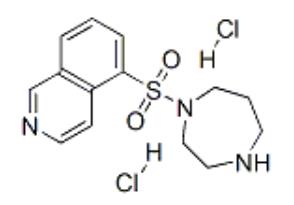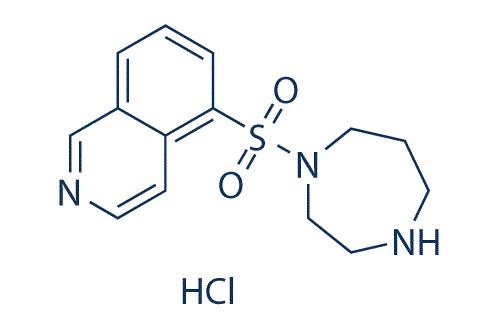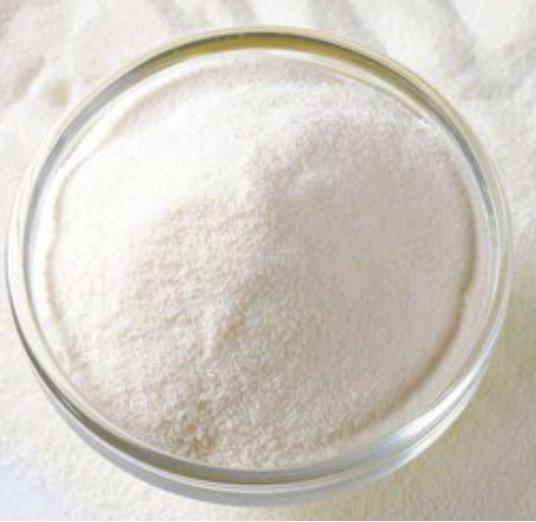Applications and Side Effects of Fasudil Hydrochloride
Introduction
Fasudil hydrochloride, chemically known as 1-(5-isoquinolinesulfonyl)homopiperazine hydrochloride, is a selective Rho kinase (ROCK) inhibitor. Rho kinase is a critical enzyme in the RhoA/Rho kinase pathway, which plays a significant role in various cellular functions including contraction, motility, proliferation, and apoptosis. By inhibiting this enzyme, Fasudil hydrochloride exerts its effects on vasodilation, anti-inflammation, and neuroprotection[1].

Fig. 1 Characteristics of Fasudil Hydrochloride
Applications
The discovery of Fasudil dates back to the late 20th century when researchers were exploring new treatments for cardiovascular diseases. Its vasodilatory properties were quickly recognized as beneficial for treating conditions associated with vasoconstriction and abnormal tissue perfusion. Fasudil hydrochloride's ability to relax vascular smooth muscles by inhibiting the ROCK pathway has made it an effective treatment for cerebral vasospasm, which is a serious complication of subarachnoid hemorrhage (SAH). The drug has been approved in Japan and China for this indication, significantly reducing the morbidity and mortality associated with SAH.
Beyond its use in cerebral vasospasm, Fasudil hydrochloride has shown potential in treating a variety of other conditions. Its neuroprotective effects are being investigated in the context of neurodegenerative diseases such as Alzheimer's disease, Parkinson's disease, and amyotrophic lateral sclerosis (ALS). These diseases share common pathophysiological mechanisms, including oxidative stress and apoptosis, where Fasudil's inhibition of the Rho kinase pathway could offer therapeutic benefits.
In the realm of ophthalmology, Fasudil hydrochloride has been explored as a treatment for glaucoma and diabetic retinopathy. By reducing intraocular pressure and improving ocular blood flow, it holds promise in preserving vision and preventing blindness in patients with these conditions[2].
The potential of Fasudil hydrochloride extends to pulmonary diseases as well. Pulmonary arterial hypertension (PAH), a condition characterized by high blood pressure in the arteries of the lungs, has been a focus of Fasudil's clinical applications. Its vasodilatory effect on pulmonary vasculature offers a novel approach to managing PAH, potentially improving patient outcomes and quality of life.
Limitations and side effects
Fasudil hydrochloride presents a beacon of hope in the treatment of various medical conditions due to its unique mechanism of action, it is imperative to underscore the nuances associated with its administration, particularly its limitations and potential side effects. The therapeutic efficacy of Fasudil hydrochloride hinges on a delicate balance between its beneficial effects and the adverse reactions it may precipitate. These adverse reactions, though generally manageable, underscore the need for vigilant patient monitoring and careful dosage adjustment to mitigate risks and optimize clinical outcomes.
Headaches, a common side effect associated with Fasudil hydrochloride, may range from mild to severe and could potentially detract from the patient's quality of life and adherence to the medication regimen. Dizziness, another reported side effect, poses a risk for falls and injuries, especially in elderly populations or those with pre-existing mobility issues. Gastrointestinal disturbances, including nausea and diarrhea, not only cause discomfort but can also lead to dehydration and electrolyte imbalances if not properly managed. These side effects, while not exhaustive, highlight the drug's impact on systemic functions, necessitating a comprehensive approach to patient care.
The limitations of Fasudil hydrochloride extend beyond its side effects to encompass challenges in its clinical application. The drug's efficacy in treating various conditions is still under investigation, with ongoing research seeking to delineate its optimal therapeutic context. Variability in patient response to the medication further complicates its use, suggesting that personalized medicine approaches may be necessary to achieve the best outcomes. Additionally, the potential long-term effects of Fasudil hydrochloride are not yet fully understood, raising questions about its suitability for chronic use.
Conclusion
Fasudil hydrochloride represents a significant advancement in the field of medicine, offering new hope for patients suffering from a range of conditions. Its journey from a vascular smooth muscle relaxant to a potential therapeutic agent for neurodegenerative diseases, ocular disorders, and pulmonary hypertension underscores the importance of ongoing research and innovation in drug development. As we gain a deeper understanding of its pharmacological properties and clinical applications, Fasudil hydrochloride is poised to become an integral part of the therapeutic arsenal against diseases that challenge humanity.
References
[1]Zhou H, Fang C, Zhang L, et al. Fasudil hydrochloride hydrate, a Rho-kinase inhibitor, ameliorates hepatic fibrosis in rats with type 2 diabetes[J]. Chinese Medical Journal, 2014, 127(2): 225-231.
[2]Zhou H, Zhang K X, Li Y J, et al. Fasudil hydrochloride hydrate, a Rho‐kinase inhibitor, suppresses high glucose‐induced proliferation and collagen synthesis in rat cardiac fibroblasts[J]. Clinical and Experimental Pharmacology and Physiology, 2011, 38(6): 387-394.
Related articles And Qustion
See also
Lastest Price from Fasudil hydrochloride manufacturers

US $0.00/g2025-04-21
- CAS:
- 105628-07-7
- Min. Order:
- 1g
- Purity:
- 98%-102%
- Supply Ability:
- 1000g

US $0.00/kg2025-04-02
- CAS:
- 105628-07-7
- Min. Order:
- 1kg
- Purity:
- 99%
- Supply Ability:
- 10000kg



